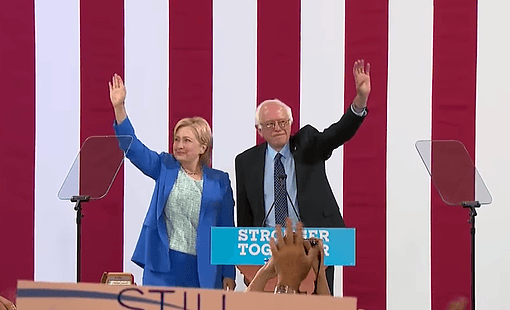
It has been a couple of days since Bernie Sanders’ endorsement of Hillary Clinton and the Internet is still seething with Sanders’ supporters at each other’s throats. Most are maintaining loyalty to the man, falling on their swords for him. In a collective mass delusion, they see the reality of Sanders’ capitulation as some kind of grand master strategy for a win at the Democratic National Convention. Anything to deny what is plain for all to see: Bernie Sanders, the so-called champion of the 99%, a “once in a lifetime” “incorruptible candidate” has bent his knee to Hillary Clinton, a corrupt politician who is the epitome of everything he has supposedly stood against throughout his presidential run and decades-long career.
In our age of identity politics, people form strong attachments to individual candidates, and Bernie Sanders swept millions with his likeability, no-nonsense manner, integrity, goofy humor and overall realness. For those who supported and even love the man, the sight of his endorsement on TV was humiliating, pathetic and tragic. But did Bernie really sell out?
The Prisoner’s Dilemma
Emotions run high and tend to cloud judgement. Therefore, in order to judge whether Bernie Sanders sold out it is useful to fall back on a methodical, scientific analysis. For this, I will repurpose a technique called “The Prisoner’s Dilemma”, a scenario analyzed by use of principles of game theory:
The Prisoner’s Dilemma, developed by mathematicians Merrill Flood and Melvin Dreshner, is an analysis of a hypothetical situation. The police apprehend two accomplices for committing a minor crime, but they’re suspected of a greater offense. The evidence for the greater offense, however, is circumstantial. The police need their confession to convict.
For this purpose, the accomplices are separated and individually presented with the following options: squeal on your partner and go free (and be absolved of the lesser crime) or remain silent and risk your partner squealing on you, in which case you’ll get the maximum prison term for the major offense.
But there are two more possible scenarios: if both prisoners squeal, they each get an intermediate sentence. Lastly, if both prisoners stay silent, they’ll be tried for the lesser offense, and could still end up in jail.
Studies show that although game theory predicts that the rational choice for each prisoner (dictated by self-preservation) is to squeal on his or her partner, most humans will attempt to at least remain faithful to their partner once before giving them up, which demonstrates the tendency of humans to value social bonds. (the above originally published here).
The Politician’s Dilemma (see Table below)
It is useful to apply a similar 2 x 2 approach to Bernie Sanders’ case, coined here as “The Politician’s Dilemma”. For this, we test the interaction between a set of two parameters that directly relate to the question of Bernie Sanders’ endorsement of Hillary Clinton:
1) Hillary Clinton’s record as a politician
2) Bernie Sanders’ familiarity with her record
Similar to the case of the Prisoner’s Dilemma, the interaction of these two variables will generate four possible options, and a solution to our question of Sanders’ integrity.
Bernie Sanders has been a progressive Democrat/Independent politician for decades. He ran his current presidential campaign on an anti-establishment platform, frequently calling out Wall Street and its ties with Washington. Sanders repeatedly described corporations and their ties to government as the corruption that lies at the roots of an economy that is rigged in favor of the 1%, and prided himself on the fact that his campaign raised all of its money from individual contributions (averaging $27 of course). Further, Bernie correctly identified Hillary Clinton as the representative of the establishment he was rallying people against. He probably knows her record better than most, including her sordid history of corruption, warmongering and trade deals that have made her one of the most unfavorable candidates to run for President of the United States.
Importantly, Bernie Sanders did his research, and still endorsed Hillary Clinton though he had other options (e.g. go Green, bow out without endorsing her, waiting for the convention).
Sanders touted changing the entire system as his objective (that’s what a revolution means), not making small, incremental gains in the form of assurances on the party platform. Any promises about personal promotion to himself or those close to him, such as a VP position or chairing an important committee, fall in the realm of personal gain and are by definition selling out. Thus, any deals that Sanders made with Clinton are a capitulation of his “revolutionary” movement and its incorporation into the Democratic Party establishment.
The Politician’s Dilemma: Results
